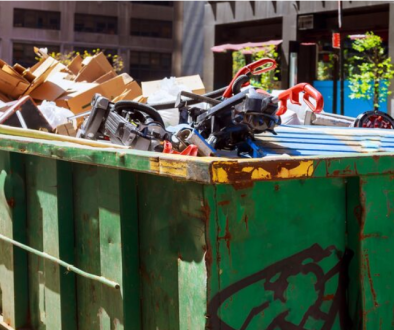House renovations can be a rewarding experience, enhancing the aesthetics and functionality of your living spaces while potentially increasing your property’s value. However, planning a successful renovation requires meticulous consideration of various factors, among which effective rubbish management is crucial. Neglecting waste management during renovations can lead to hassles, delays, and increased costs.
As a family-run skip hire and aggregate company servicing Staffordshire, we understand the importance of efficient rubbish management in successful renovation projects, and we are committed to providing expert guidance and support to ensure a smooth process.
In this ultimate guide, we will delve into the essentials of planning a house renovation with particular emphasis on skip hire and rubbish management considerations. From selecting the appropriate skip size and obtaining necessary permits to optimising waste segregation and recycling potential, we will provide practical tips and resources to help you navigate this critical aspect of renovation planning.
Additionally, we will highlight how partnering with a reliable and environmentally conscious service provider can streamline your renovation project’s waste management requirements, ensuring adherence to regulations, maximising sustainability, and enhancing overall project efficiency.
Whether you are a seasoned renovator or planning your first home improvement project, this guide will equip you with valuable insights and best practices to navigate the complexities of rubbish management during a renovation. By embracing a comprehensive waste management strategy, you can secure the success of your renovation endeavours while contributing to a greener, cleaner, and more sustainable future.
Selecting the Right Skip Size for Your Renovation Project
One of the most critical factors to consider when planning rubbish management for a house renovation is selecting the appropriate skip size. Choosing the right size ensures efficient waste disposal, cost-effectiveness, and a smooth renovation process. Here are some practical guidelines for determining the ideal skip size for your home renovation project:
1. Estimate Waste Volume: Assess the volume of rubbish your renovation project is likely to generate, considering factors such as project scope, materials, and fixtures being replaced.
2. Consider Waste Types: Take into account the variety of waste materials that may result from your renovation, including rubble, wood, glass, and metal, as each may require specific disposal arrangements.
3. Consult with Experts: Seek advice from a trusted skip hire provider, who can help you choose the appropriate skip size to accommodate your project’s waste management needs.
Navigating Skip Hire Permits and Regulations
When hiring a skip for your house renovation, it is crucial to be aware of any permits or regulations that may apply. Ignoring these requirements can result in fines and penalties, as well as delays in your project’s timeline. Keep these points in mind to ensure compliance with skip hire regulations:
1. Investigate Local Permit Requirements: If you plan to place the skip on public property such as a street or footpath, research local council requirements to determine if a permit is required and secure necessary permissions before proceeding.
2. Placement Restrictions: Be aware of any restrictions on skip placement, such as distance from junctions, visibility requirements, and prohibitions on blocking access to utility equipment.
3. Hazard Prevention: If your skip is placed in a location that could pose a hazard to passing traffic or pedestrians, make sure it is properly lit and marked with reflective materials.
Optimising Waste Segregation and Recycling Strategies
Maximising recycling potential and waste segregation is a crucial part of sustainable rubbish management during house renovations. By sorting waste materials at the source and utilising recycling services, you can minimise your project’s environmental impact. To optimise waste segregation and recycling strategies during your renovation, consider the following:
1. Establish Segregation Zones: Designate specific areas within your renovation site for waste segregation, providing clearly labelled rubbish containers for different waste types such as rubble, wood, metal, and glass.
2. Educate Your Team: Clearly communicate waste segregation and recycling procedures to everyone involved in the renovation process, ensuring they understand the importance of sorting materials and disposing of waste responsibly.
3. Hire a Recycling-Focused Skip Provider: Choose a skip hire provider that prioritises recycling and has robust waste sorting and recycling facilities which aims to recycle up to 90% of collected waste.
Disposing of Hazardous Waste during Renovations
House renovations can sometimes generate potentially hazardous waste materials, which require careful disposal in line with regulations. To address hazardous waste during your renovation project, keep these guidelines in mind:
1. Identify Potential Hazardous Waste: Be aware of any potentially hazardous waste materials generated, such as asbestos, paint, solvents, or chemicals, and ensure that you separate them from non-hazardous waste.
2. Follow Safe Handling Procedures: Adhere to recommended safety procedures when handling hazardous waste materials, such as wearing appropriate personal protective equipment and transporting waste securely in sealed containers.
3. Consult Your Skip Hire Provider: Inform your skip hire provider of any hazardous waste requirements and seek their expert advice on appropriate disposal methods and facilities.
Conclusion
Effective rubbish management is an essential aspect of planning a successful house renovation. It contributes to a seamless process, cost efficiency, and environmental sustainability. By carefully considering factors such as skip size, waste segregation and recycling strategies, permit requirements, and hazardous waste disposal, you can ensure that your project adheres to best practices and benefits from a comprehensive waste management approach.
Partnering with a reliable and environmentally conscious skip hire provider like Enviro Skip Hire can significantly streamline your house renovation project’s waste management requirements, ensuring adherence to regulations, maximising sustainability, and enhancing the overall project experience. By investing in responsible rubbish management practices, you can enjoy a smoother renovation process while contributing to a more sustainable future for the construction industry and the environment as a whole.




